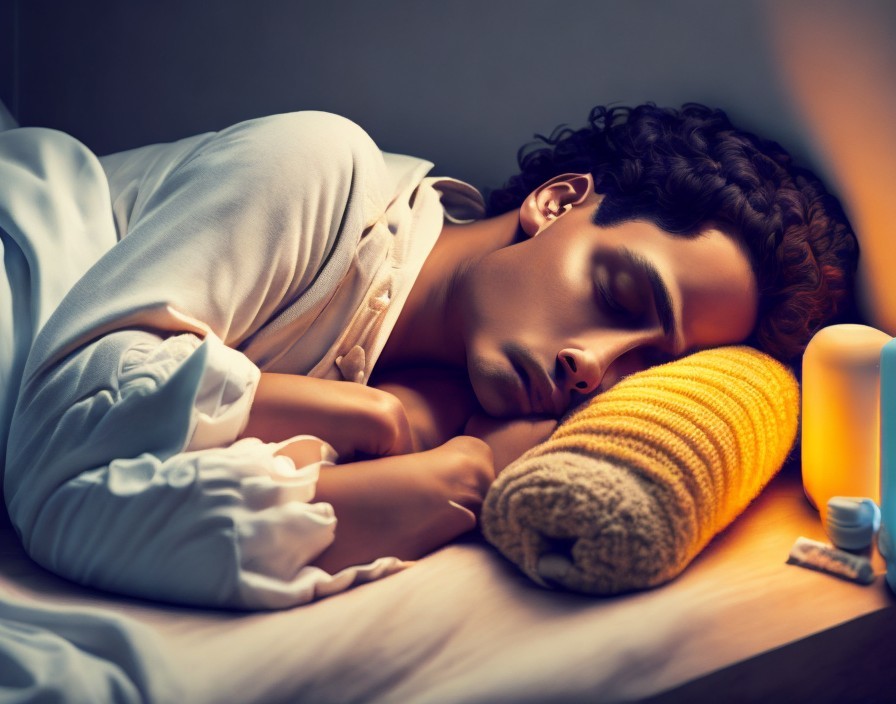
Have you ever woken up to wet sheets and a feeling of embarrassment, even though you're well past childhood? You're not alone. Many adults experience bedwetting, also known as nocturnal enuresis, and sometimes it's linked to their dreams. Let's dive into this topic and we'll explore the causes of dream-induced bedwetting in adults, how stress and anxiety play a role, and effective treatments to manage and what you can do about it.
Have an interesting dream to share? Join Questmist to document your dreams, get expert interpretations, and connect with a community of dreamers — Register Now or Login to begin your journey!
Don’t forget to try Questmist’s AI dream interpreter—click here to interpret your dreams!
What Is Dream-Induced Bedwetting?
Dream-induced bedwetting in adults is exactly what it sounds like—wetting the bed while you're asleep and dreaming. It's a type of adult bedwetting that happens specifically when you're in the midst of a dream, often an intense or stressful one. This can be confusing and upsetting for many people, especially if it's never happened to them before.
Why Does Dream-Induced Bedwetting Happen?
There are several reasons why adults might experience bedwetting due to dreams. Let's break down some of the main causes:
Stress and Anxiety
One of the biggest culprits behind dream-induced nocturnal enuresis in adults is stress. When you're stressed or anxious, it can affect your sleep in many ways. You might have more vivid or disturbing dreams, and your body might not respond to signals from your bladder as well as it usually does.
How stress and anxiety contribute to adult bedwetting during dreams is pretty straightforward. When you're stressed, your body produces more of the stress hormone cortisol. This can increase urine production and make you need to pee more often. At the same time, stress can make your sleep lighter and more fragmented, which means you might not wake up when your bladder is full.
Sleep Disorders
Certain sleep disorders are linked to bedwetting in adults during dreams. For example, sleep apnea, a condition where you stop breathing briefly during sleep, can lead to more frequent urination at night. Other sleep disorders, like insomnia or restless leg syndrome, can disrupt your sleep cycles and make it harder for your brain to process signals from your bladder.
Medications
Some medications can increase urine production or make you sleep more deeply, both of which can contribute to bedwetting. If you've recently started a new medication and notice bedwetting episodes, it's worth talking to your doctor about it.
Underlying Medical Conditions
Sometimes, dream-related bedwetting in adults can be a sign of an underlying medical condition. Diabetes, urinary tract infections, and neurological disorders can all cause increased nighttime urination or difficulty controlling the bladder.
Genetics
Believe it or not, there might be a genetic component to adult bedwetting. If you have family members who experienced bedwetting as adults, you might be more likely to experience it too.
The Impact of Dream-Induced Bedwetting
Dealing with bedwetting as an adult can be tough. It's not just about changing the sheets—it can have a real impact on your life and well-being.
Emotional Toll
Many adults who experience bedwetting due to dreams feel embarrassed or ashamed. It can affect their self-esteem and make them anxious about going to sleep. Some people might avoid sleeping over at friends' houses or going on trips because they're worried about having an episode.
Relationship Challenges
For adults who share a bed with a partner, bedwetting can put a strain on the relationship. It might lead to feelings of embarrassment or frustration for both people involved.
Sleep Quality
Worrying about bedwetting can make it harder to fall asleep or stay asleep. This can lead to a vicious cycle where poor sleep leads to more stress, which in turn can make bedwetting more likely.
You don't need to buy or pay for a subscription of Dream Journal , Join Questmist to document your dreams, get expert interpretations, and connect with a community of dreamers — Register Now or Login to begin your journey!
How Stress and Anxiety Contribute to Adult Bedwetting During Dreams
The Connection Between Stress, Anxiety, and Bedwetting
Stress and anxiety are powerful emotions that can affect the body in numerous ways. When you're anxious, your body produces stress hormones like cortisol, which can interfere with your sleep cycle. This can lead to more vivid dreams or nightmares, which may result in bedwetting. Additionally, people who experience high levels of stress or anxiety may have an overactive bladder, making them more prone to bedwetting during dreams.
Managing Bedwetting in Adults Caused by Nightmares or Intense Dreams
If your bedwetting is caused by nightmares or intense dreams, managing your stress and anxiety levels is key. Relaxation techniques such as deep breathing exercises, meditation, or yoga can help calm your mind before bed. It might also be helpful to establish a bedtime routine that promotes relaxation, such as reading a book, taking a warm bath, or listening to soothing music.
Effective Treatments for Dream-Related Bedwetting
Now that we understand more about the causes and impact of dream-induced bedwetting in adults, let's talk about how to manage it. There are several effective treatments for dream-related bedwetting in adults, ranging from lifestyle changes to medical interventions.
Reduce Stress and Anxiety
Since stress is a major contributor to bedwetting and sleep anxiety in adults, finding ways to relax before bed can be really helpful. Try techniques like:
- Deep breathing exercises
- Meditation or mindfulness practices
- Gentle yoga or stretching
- Reading a calming book
- Listening to soothing music
Improve Sleep Habits
Better sleep habits can help reduce the likelihood of bedwetting. Some tips include:
- Stick to a regular sleep schedule
- Create a relaxing bedtime routine
- Make sure your bedroom is dark, quiet, and comfortable
- Avoid screens for at least an hour before bed
- Limit caffeine and alcohol, especially in the evening
Manage Fluid Intake
While it's important to stay hydrated, managing when you drink can help with bedwetting. Try:
- Drinking most of your fluids earlier in the day
- Limiting drinks in the evening, especially those with caffeine or alcohol
- Going to the bathroom right before bed
Use Protective Products
While you're working on addressing the root causes, using protective products can help manage the practical aspects of bedwetting. Options include:
- Waterproof mattress covers
- Absorbent underwear designed for adults
- Bed pads
Seek Medical Help
If lifestyle changes aren't enough, it's a good idea to talk to a doctor. They can help identify any underlying medical conditions and suggest treatment options for adult bedwetting from dreams. These might include:
- Medications to reduce urine production at night
- Treatments for sleep disorders
- Bladder training exercises
- Counseling or therapy to address stress and anxiety
Understanding Bedwetting in Adults Related to Stress and Sleep
It's important to remember that dream-induced bedwetting in adults is more common than you might think. It's not a sign of weakness or immaturity—it's a medical issue that can be addressed.
If you're dealing with this problem, try to be kind to yourself. Remember that stress and worry can make the problem worse, so focusing on relaxation and good sleep habits can go a long way.
Also, don't be afraid to reach out for help. Whether it's talking to a trusted friend, partner, or medical professional, support can make a big difference in managing this issue.
Conclusion
Dream-induced bedwetting in adults can be a challenging and embarrassing problem, but it's one that can be managed and often resolved. By understanding the causes, seeking appropriate treatment, and making lifestyle changes, many adults find relief from this issue.
Remember, everyone's situation is unique. What works for one person might not work for another. Be patient with yourself as you work on finding the best solution for you. With time, understanding, and the right approach, you can overcome dream-induced bedwetting and get back to enjoying restful, worry-free sleep.
Frequently Asked Questions (FAQ)
1. What causes dream-induced bedwetting in adults?
Dream-induced bedwetting in adults can be caused by stress, anxiety, sleep disorders, intense dreams, and underlying medical conditions.
2. How can I stop bedwetting during dreams?
Effective ways to stop bedwetting during dreams include managing stress, practicing good sleep hygiene, trying behavioral techniques, and addressing any underlying medical conditions.
3. Is it normal for adults to wet the bed because of dreams?
While it is less common than in children, some adults do experience bedwetting due to vivid dreams or nightmares. It's important to identify the cause and seek appropriate treatment.
4. Can sleep disorders cause adult bedwetting?
Yes, sleep disorders like sleep apnea and REM sleep behavior disorder can contribute to adult bedwetting during dreams.
5. When should I see a doctor about bedwetting?
If bedwetting becomes a regular occurrence, especially if it's a new symptom, it's important to consult a healthcare provider to rule out any underlying medical conditions.


You must be logged in to post a comment. Please Login or Register .